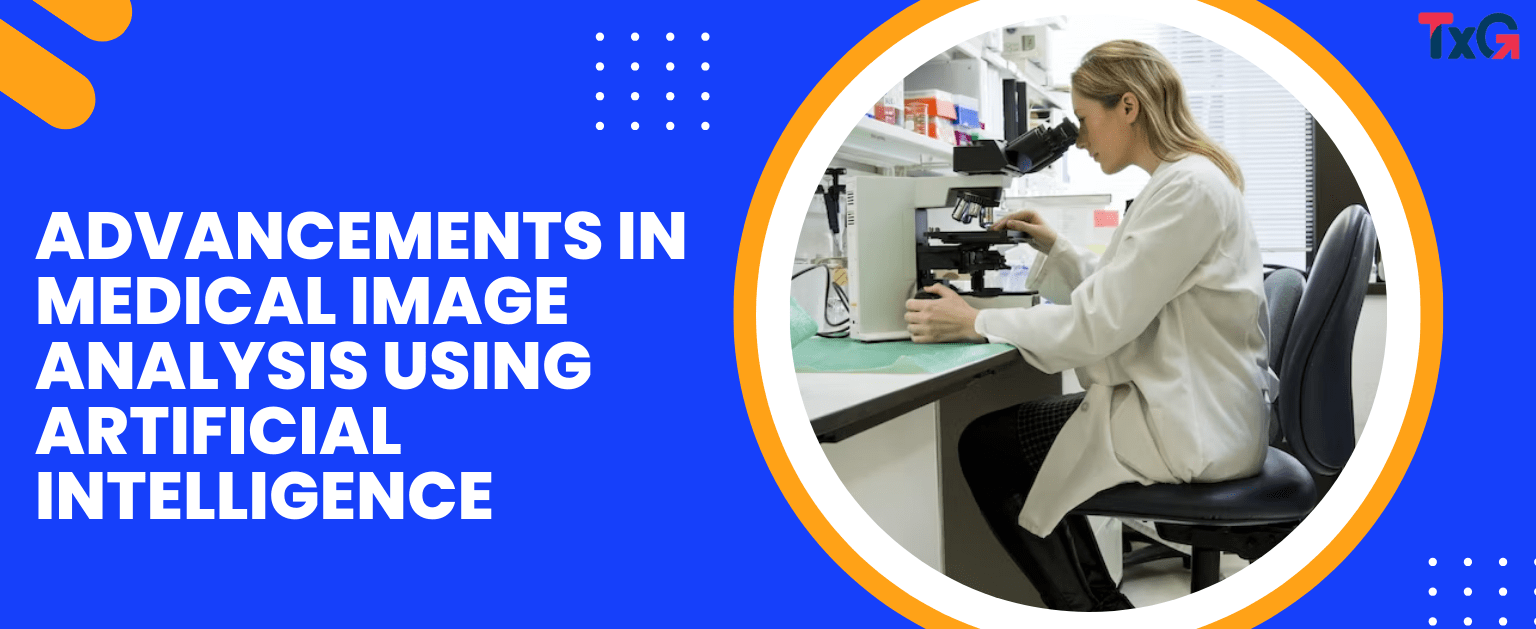Medical image analysis plays a pivotal role in modern healthcare, aiding in diagnosis, treatment
planning, and monitoring of various medical conditions. Over the years, advancements in technology
have transformed this field, with Artificial Intelligence (AI) at the forefront of innovation. In this blog
post, we will explore the significant advancements in medical image analysis made possible by AI.
Revolutionizing Healthcare through AI-Enhanced Medical Image Analysis
1. Faster and More Accurate Diagnosis
One of the most substantial contributions of AI to medical image analysis is its ability to provide
faster and more accurate diagnosis. Radiologists and medical professionals can use AI-powered tools
to analyse medical images, such as X-rays, MRIs, and CT scans, with greater precision and speed. AI
algorithms can detect abnormalities, lesions, and patterns that might be missed by the human eye,
allowing for early and more accurate diagnoses.
2. Personalized Treatment Plans
AI algorithms can analyse medical images alongside patient data, enabling the creation of
personalized treatment plans. For example, in oncology, AI can help identify the specific
characteristics of a tumour, allowing for targeted therapies that are tailored to the patient’s unique
needs. This not only improves treatment outcomes but also minimizes side effects.
3. Streamlining Workflow
AI can significantly streamline the workflow in healthcare facilities. Radiologists and clinicians can
benefit from AI tools that prioritize urgent cases, automatically sort and categorize images, and
provide preliminary assessments. This allows healthcare professionals to focus their expertise on
critical cases, reducing the time and workload for routine image analysis.
4. Early Disease Detection
AI can assist in early disease detection by continuously monitoring and analysing medical images. For
instance, AI-powered systems can track the progression of conditions like glaucoma by analysing
changes in retinal scans over time. This early detection can lead to interventions that prevent further
damage or complications.
5. Enhanced Surgical Planning
In surgical fields, AI aids in preoperative planning by providing detailed 3D reconstructions of a
patient’s anatomy based on medical imaging. Surgeons can use these reconstructions to plan precise
approaches and strategies, reducing surgical risks and optimizing outcomes.
6. Research Advancements
AI is revolutionizing medical research by enabling large-scale analysis of medical images. Researchers
can use AI to analyse thousands of images, identifying trends and patterns that inform the
development of new treatments and therapies. AI-driven research accelerates the pace of medical
discovery.
7. Telemedicine
In the era of telemedicine, AI plays a vital role in remote patient care. Medical professionals can
transmit medical images to specialists for remote analysis, and AI can assist in the interpretation.
This extends healthcare access to underserved areas and improves patient outcomes through timely
consultations.
8. Radiomics and Predictive Analytics
AI-driven radiomics focuses on extracting a vast amount of quantitative data from medical images.
This data can be used for predictive analytics, helping in patient risk assessment and treatment
planning. AI can identify subtle image features that may correlate with disease progression,
providing valuable insights for healthcare providers.
Conclusion
Advancements in medical image analysis using AI are transforming the healthcare landscape. From
faster and more accurate diagnoses to personalized treatment plans and research breakthroughs, AI
is enhancing patient care and the capabilities of healthcare professionals. As AI technology continues
to evolve, we can expect even more significant contributions to the field of medical image analysis,
ultimately improving healthcare outcomes for patients worldwide.
How can we help you?
Our team of experts understands that every healthcare institution is unique. We’ll work closely with
our clients to identify their specific needs, challenges, and goals. Then, we’ll develop custom AI
algorithms or integrate pre-existing ones into their systems, ensuring that the solutions align
seamlessly with their workflow and objectives.
In today’s digital age, telemedicine is more crucial than ever. We’ll build robust telemedicine
infrastructure for our clients, creating secure platforms that facilitate the remote sharing of medical
images. Our solutions will include real-time AI-assisted analysis capabilities, allowing healthcare
professionals to collaborate effectively while maintaining patient privacy and data security.
We understand that adopting new technologies can be challenging. That’s why we offer
comprehensive training programs for healthcare professionals. We’ll ensure that radiologists and
clinicians are not only comfortable but proficient in using our AI-enhanced tools. Plus, our dedicated
technical support team will be available to address any questions or concerns promptly.
Data is a valuable asset in healthcare. We’ll implement advanced data analytics to help our clients
derive actionable insights from their medical image datasets. Our predictive analytics models will
assist in early disease detection, patient risk assessment, and treatment planning. We'll provide our
clients with data-driven recommendations that lead to improved patient care and more informed
decision-making.
Our mission as an IT solutions provider is also to empower healthcare institutions with cutting-edge
AI technology. By tailoring solutions, building telemedicine infrastructure, offering comprehensive
training and support, and providing data-driven insights, we’re committed to helping our clients
enhance patient outcomes and optimize healthcare delivery.


